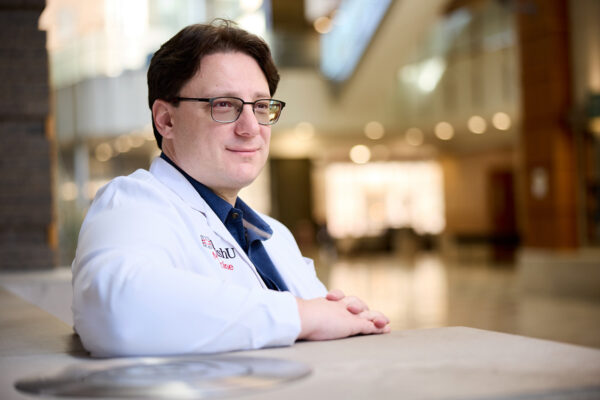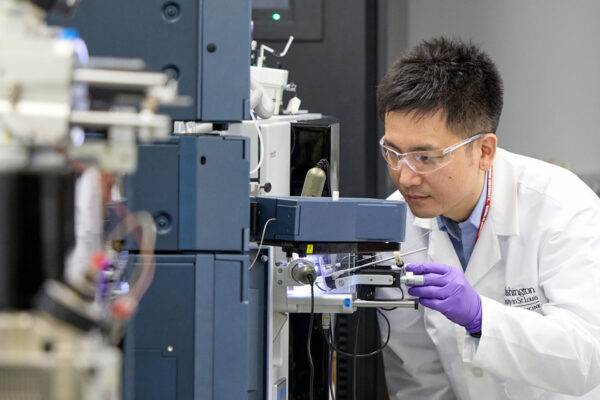
Jennifer E. Phillips-Cremins, PhD, an international leader in understanding 3D genome structure and how it affects brain development and neurological diseases, has been named a BJC Investigator at Washington University School of Medicine in St. Louis. Phillips-Cremins will join the Department of Genetics as the James McDonnell Professor and have a dual appointment in the Department of Neuroscience.
Cremins is known for her innovative approaches to understanding how the genome is packaged and how that packaging influences which genes are activated and to what degree. She and her team apply these approaches to understanding the molecular mechanisms by which the neurocircuitry of the brain is assembled and how this goes wrong in neurodevelopmental and neurodegenerative diseases.
Cremins comes to WashU Medicine from the University of Pennsylvania, where she is an associate professor and dean’s faculty fellow in the departments of Genetics and Bioengineering. Her appointment at WashU Medicine is expected to begin Nov. 1.
“I am so pleased to announce that Dr. Jennifer Phillips-Cremins will be joining our WashU Medicine research community,” said David H. Perlmutter, MD, executive vice chancellor for medical affairs, the Spencer T. and Ann W. Olin Distinguished Professor and the George and Carol Bauer Dean of WashU Medicine. “Dr. Phillips-Cremins has developed innovative approaches using spatial and genomic technologies to understand how chromatin shapes the 3D structure of the genome and the impact of these processes on neural specification and neural circuit activation in the brain and how this goes awry in neurodevelopmental and neurodegenerative diseases. By adding a spatial dimension to our understanding of chromatin’s regulatory mechanisms, Dr. Phillips-Cremins and her team pioneered the foundational basic science insights into the genome’s structure-function relationship in the mammalian brain and in neurological disorders.”
The BJC Investigators Program brings to WashU Medicine scientists who will have a transformational impact on research programs, drive innovative approaches to major biological questions, and whose discoveries stand to inform new ways of understanding disease and developing treatments.
The BJC Investigators Program is focused on basic science and was inspired by the Howard Hughes Medical Institute’s philosophy of investing in scientists with exceptional creative talent. Launched in 2016, the program aims to bring 10 highly regarded researchers to WashU Medicine and the life sciences ecosystem in St. Louis. Phillips-Cremins is the eighth BJC Investigator named.
BJC Investigators are recommended by a search committee of leading scientists at WashU Medicine. Their charge is to select candidates who already have indelibly changed their fields, whose discoveries will result in new and fundamental shifts in scientific thinking, and whose laboratories have become hubs for even more work that can galvanize and advance the impact of the school’s preclinical departments.
If stretched out in a line, the DNA in a single human cell is about six feet long. Fitting it into a microscopic cell nucleus requires extraordinarily complex folding, wrapping and packing — and this is not simply for storage but also helps govern the cell’s identity and functions over a lifetime. At the inception of Cremins’ lab, it was unknown how genomes fold in the mammalian brain below the resolution of a megabase (1 million bases), and whether and how higher-order chromatin structure could deterministically influence genome function. The pioneering work of Cremins and her team has elucidated the mammalian genome’s structure-function relationship, including the functional role for chromatin loops in the upregulation of genes encoding axon guidance, dendritic spine morphology and synaptic plasticity during neural maturation in vivo and activity-dependent gene expression during neural stimulation in vitro, as well as in the localization of replication origins.
The Cremins team also discovered severe genome misfolding and pathologic inter-chromosomal interactions linked to the silencing of crucial synapse genes vulnerable to genetic instability in fragile X syndrome. Thus, by adding a spatial, third dimension to our understanding of chromatin’s regulatory mechanisms, the Cremins team has pioneered major foundational basic science insights into the genome’s structure-function relationship when mammalian cells transition states in the healthy and diseased brain.
As a BJC Investigator, a major focus of the lab’s research will be on shedding light into a fundamental mystery in the field of neuroscience: how memory is stored over decades despite the rapid turnover of proteins and other key molecules in the brain. Her lab will explore how chromatin’s structure-function relationship influences RNA molecules contributing to changes in synapses — the junctions between neurons — in memory disorders. Such investigations could shed light on high-impact areas of brain research, including the encoding, consolidation and recall of memory in healthy brains, the forgetting of memory in diseases like Alzheimer’s, and the resilience of fear memories in post-traumatic stress disorder.
“We are happy to welcome Dr. Phillips-Cremins to our department and look forward to working with her to build on the exciting research that WashU Medicine is cultivating at the intersection of genetics and neuroscience,” said Ting Wang, PhD, the Sanford C. and Karen P. Loewentheil Distinguished Professor of Medicine and head of the Department of Genetics. “In addition to her extraordinary research accomplishments, Dr. Phillips-Cremins is a dedicated mentor with a long history of providing guidance to the many outstanding investigators who have trained in her lab, nearly all of whom are now embarking on independent careers in science and medicine.”
Phillips-Cremins earned her bachelor’s degree in chemical engineering and mathematics at Clarkson University and her doctorate in biomedical engineering at Georgia Institute of Technology. She continued her training by leading a unique pan-institutional interdisciplinary postdoc simultaneously in the labs of Job Dekker, PhD, of the University of Massachusetts, and Victor Corces, PhD, of Emory University, before joining the faculty of the University of Pennsylvania in 2014.
Phillips-Cremins has received many honors and awards, including the National Institutes of Health (NIH) Director’s New Innovator Award, an Alfred P. Sloan Foundation Fellowship, two Kavli Frontiers of Science Fellowships, the International Society for Stem Cell Research Dr. Susan Lim Award for Outstanding Young Investigator, the National Science Foundation CAREER award, a New York Stem Cell Foundation Robertson Investigator Award, and the NIH Director’s Pioneer Award.
About Washington University School of Medicine
WashU Medicine is a global leader in academic medicine, including biomedical research, patient care and educational programs with 2,900 faculty. Its National Institutes of Health (NIH) research funding portfolio is the second largest among U.S. medical schools and has grown 83% since 2016. Together with institutional investment, WashU Medicine commits well over $1 billion annually to basic and clinical research innovation and training. Its faculty practice is consistently within the top five in the country, with more than 1,900 faculty physicians practicing at 130 locations and who are also the medical staffs of Barnes-Jewish and St. Louis Children’s hospitals of BJC HealthCare. WashU Medicine has a storied history in MD/PhD training, recently dedicated $100 million to scholarships and curriculum renewal for its medical students, and is home to top-notch training programs in every medical subspecialty as well as physical therapy, occupational therapy, and audiology and communications sciences.
Originally published on the WashU Medicine website


